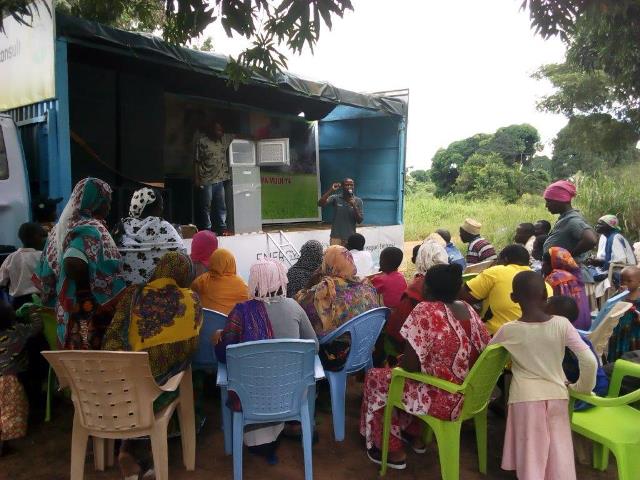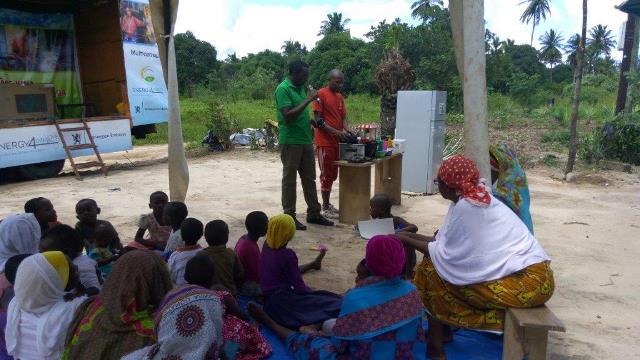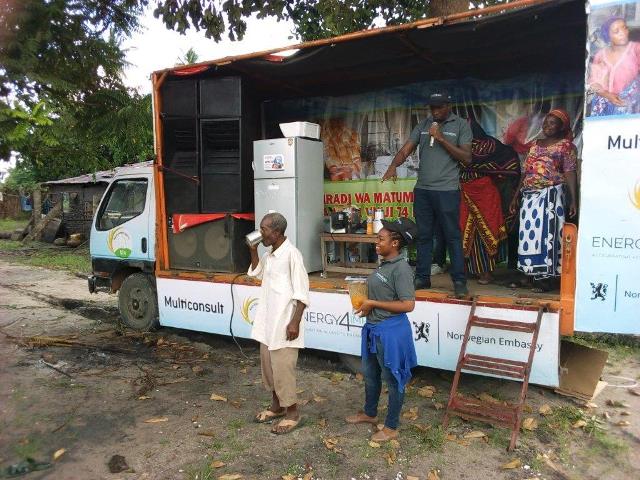
Demonstrating use of some electrical appliances such as fridges during a village-level sensitisation event in a Tanzania village.
By Joshua Masinde for TZ Business News.
A pilot entrepreneurship training project in the Tanga and Pwani regions in Tanzania is working hard to introduce rural entrepreneurs to the value of electricity beyond lighting homes.
Businesses in the villages are being told, for instance, that they could leverage the power of electricity to automate operations and eliminate intensive and time consuming manual tasks.
They could use electricity to improve efficiency, pursue expansion, diversification or value addition activities. By saving on costs and time associated with manual tools, this would result in productivity improvements, translating into better profit margins.
Some of the potential commercial engagements that can utilise electric power include agro-processing, wood milling, carpentry, chick incubation, sale of cold drinks, among others.
In the newly electrified villages of Tanzania’s Tanga and Pwani regions, Productive Use of Energy (PUE) champions are inspiring local communities to use the new power source for income-generation.
As entrepreneurs themselves, the champions are playing a critical role of creating interest among other entrepreneurs to take up productive end use activities; activities which hold the key to livelihood improvements and economic transformation of rural areas.

A demonstration of the use electrical appliances such as fridges juice blenders fryers (chips popcorn) during village-level event
Energy demand uptake is a key priority for the country’s Rural Energy Agency’s grid densification programme–the programme which aims to stimulate economic development in newly electrified villages.
The organization Energy 4 Impact is working with Tanzania’s Rural Energy Agency (REA) to empower local entrepreneurs to fully benefit from grid expansions in the country by offering micro-enterprise development support and financing facilities to micro-entrepreneurs wishing to buy commercial tools and appliances.
The PUE project is opening up opportunities for rural communities to think beyond lighting or heating. And this is part of the Rural Electrification Densification Programme (REDP), a partnership between Energy 4 Impact, REA, Multiconsult and the Norwegian Embassy in Tanzania.
Apart from improving rural economies by creating jobs, such activities have the potential to increase electricity consumption, thereby making grid extensions viable for governments or investors.
In an effort to raise awareness about income-earning opportunities that utilise the power connectivity, Energy 4 Impact has been running productive use clinics in the villages of Tanga and Pwani.
To ensure full participation of the communities and their leaders, Energy 4 Impact enlisted the help of the PUE champions, who are engaged in several entrepreneurial endeavours, in conducting the awareness events and roadshows.
Three days to the start of the events, the PUE champions, aboard branded trucks, crisscrossed the villages urging residents to be in attendance. They became the trusted go-to persons on topics around PUE.
Local authorities, appliance suppliers, community-based organisations and financiers were similarly involved in the events from the outset. Such collaborative approaches contributed to the success of the events. In total, over 2,700 people in 39 villages were sensitised on new business opportunities that can make use of the new power source.
Tanga and Pwani are pilot areas. There are plans to expand the project so that it covers 300 villages after the pilot phase is over
“We gave the villagers present training on entrepreneurship, record keeping, marketing and customer care. We shared with them insights on the suitable financing prospects and the process of obtaining electric appliances for income generation. Furthermore, we tipped them on workplace health and safety measures related to use of electrical appliances and how to deal with or avoid electric hazards,” says Fredrick Tunutu, Energy 4 Impact’s REDP Programme Manager.
Apart from showing a PUE video, the mentors staged real-life demos on how to use common electrical appliances such as fridges, juice blenders, hair clippers, hair dryers, fryers (for chips or popcorns).
“The villagers could not hide their excitement as they watched a PUE video on a pop-up screen showing entrepreneurs using electric machines and tools for welding, grain milling, carpentry, car repair, water supply, construction and sale of cold drinks,” says Anna Jansan, a PUE champion and entrepreneur who runs a retail cum grocery shop. She recently began selling cold drinks after acquiring a fridge thanks to the grid connection.

Energy 4 Impact REDP team sensitising villagers on how they can use electricity for enterprise development
A total of 201 micro-enterprises and SMEs were recruited to be part of the 300 enterprises that would receive business and mentorship support. Such support will include business case assessments, value chain analysis, financial needs evaluation and linkages with financial institutions.
To effectively support these rural-based entrepreneurs in their productive use endeavours, Energy 4 Impact entered into partnerships with key stakeholders such as the Private Agriculture Sector Support (PASS), an agricultural finance provider. Through this partnership, agro-processors would be linked to Vision Fund International, which offers micro-finance services to rural communities.
As the PU awareness continues, with support for entrepreneurs taking shape, uptake of electricity for commercial uses in the villages is poised to grow by 15 per cent. Over 250 electrical appliances are to be supplied to entrepreneurs, with 120 loans issued to businesses.



